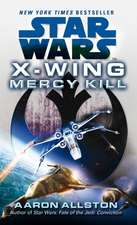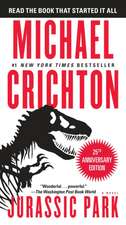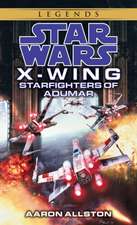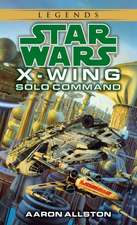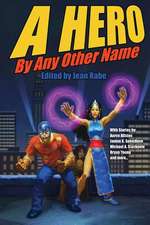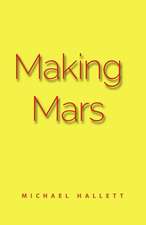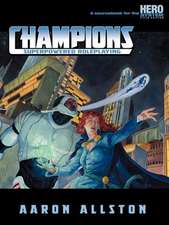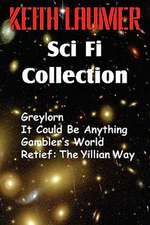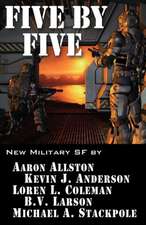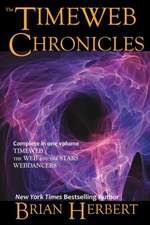Mercy Kill: Star Wars: X-Wing (Unnumbered)
Autor Aaron Allstonen Limba Engleză Paperback – 24 iun 2013
Wraith Squadron: The elite X-wing unit of rogues and misfits who became legends of the Rebellion, specializing in carrying out the most dangerous and daring operations before breaking up and going their separate ways. Now, three decades later, their singular skills are back in demand for a tailor-made Wraith Squadron mission.
A powerful general in the Galactic Alliance Army, once renowned for his valor, is suspected of participating in a conspiracy that nearly succeeded in toppling the Alliance back into the merciless hands of the Empire. With orders to expose and apprehend the traitor—and license to do so by any and all means—the Wraiths will become thieves, pirates, impostors, forgers . . . and targets, as they put their guts, their guns, and their riskiest game plan to the test!
“A rare entry point for newbies to the Star Wars expanded universe.”—Kirkus Reviews
Preț: 57.90 lei
Nou
Puncte Express: 87
Preț estimativ în valută:
11.08€ • 11.60$ • 9.17£
11.08€ • 11.60$ • 9.17£
Carte disponibilă
Livrare economică 17-31 martie
Preluare comenzi: 021 569.72.76
Specificații
ISBN-13: 9780345511157
ISBN-10: 0345511158
Pagini: 440
Dimensiuni: 108 x 176 x 34 mm
Greutate: 0.23 kg
Editura: BALLANTINE BOOKS
Seria Star Wars: X-Wing (Unnumbered)
ISBN-10: 0345511158
Pagini: 440
Dimensiuni: 108 x 176 x 34 mm
Greutate: 0.23 kg
Editura: BALLANTINE BOOKS
Seria Star Wars: X-Wing (Unnumbered)
Notă biografică
Aaron Allston is the New York Times bestselling author of the Star Wars: Fate of the Jedi books Conviction, Outcast, and Backlash; the Star Wars: Legacy of the Force novels Betrayal, Exile, and Fury; the Star Wars: The New Jedi Order: Enemy Lines adventures Rebel Dream and Rebel Stand; novels in the popular Star Wars X-Wing series, including Mercy Kill; and the Doc Sidhe novels, which combine 1930s-style hero-pulps with Celtic myth. He is also a longtime game designer and in 2006 was inducted into the Academy of Adventure Gaming Arts & Design (AAGAD) Hall of Fame. He lives in Central Texas.
Extras
CHAPTER ONE
Ryvester, Meridian Sector
13 ABY (31 Years Ago)
Imperial Admiral Kosh Teradoc paused, irritated and self-conscious, just outside the entryway into the club. His garment, a trades-being’s jumpsuit, was authentic, bought at a used-clothes stall in a poverty-stricken neighborhood. And the wig that covered his military-cut blond hair with a mop of lank, disarrayed brown hair was perfect. But his posture--he couldn’t seem to shake off his upright military bearing, no matter how hard he tried. Loosening his shoulders, slumping, slouching . . . nothing worked for more than a few seconds.
“You’re doing fine, Admiral.” That was one of his bodyguards, whispering. “Try . . . try smiling.”
Teradoc forced his mouth into a smile and held it that way. He took the final step up to the doors. They slid aside, emitting a wash of warmer air and the sounds of voices, music, and clinking glasses.
He and his guards moved into the club’s waiting area. Its dark walls were decorated with holos advertising various brands of drinks; the moving images promised romance, social success, and wealth to patrons wise enough to choose the correct beverage. And they promised these things to nonhumans as well as humans.
One of Teradoc’s guards, taller and fitter than he was and dressed like him, kept close. The other three held back as though they constituted a different party of patrons.
The seater approached. A brown Chadra-Fan woman who stood only as tall as Teradoc’s waist, she wore a gold hostess gown, floor-length but exposing quite a lot of glossy fur.
Teradoc held up three fingers. He enunciated slowly so she would understand. “Another will be coming. Another man, joining us. You understand?”
Her mouth turned up in the faintest of smiles. “I do.” Her voice was light, sweet, and perhaps just a touch mocking. “Are you the party joining Captain Hachat?”
“Um . . . yes.”
“He’s already here. This way, please.” She turned and led them through broad, open double doors into the main room.
Teradoc followed. He felt heat in his cheeks. The little Chadra-Fan--had she actually condescended to him? He wondered if he should arrange an appropriate punishment.
The main room was cavernous, most of its innumerable tables occupied even at this late hour. The music and the din of conversation grew louder. And the smells--less than a quarter of the patrons were human. Teradoc saw horned Devaronians, furry Bothans, diminutive Sullustans, enormous, green-skinned Gamorreans, and more, and he fancied he could smell every one of them. And their alcohol.
“You’re upright again, sir. You might try slouching.”
Teradoc growled at his guard but complied.
There was one last blast of music from the upraised stage, and then the band, most of the players nonhuman, rose to the crowd’s applause. They retreated behind the stage curtain.
Moments later the noise of the audience, hundreds of voices, changed--lowered, became expectant in tone. A new act filed out onstage. Six Gamorrean males, dressed in nothing but loincloths, their skin oiled and gleaming, moved out and arrayed themselves in a chevron-shaped formation. Recorded dance music, heavy on drums and woodwinds, blasted out from the stage’s sound system.
The Gamorreans began moving to the music. They flexed, shimmied, strutted in unison. A shrill cry of appreciation rose from Gamorrean women in the audience, and from others as well.
Teradoc shuddered and vowed to sit with his back to the dancers.
The Chadra-Fan led him to a table only a few meters from the stage. A human man sat there already. Of medium height and muscular, he was young, with waist-length red hair in a braid. Costume jewelry, polished copper inset with black stones, was woven into the braid. He wore a long-sleeved tunic decorated with blobs of color of every hue, mismatched and discordant; it clashed with his military-style black pants and boots. He stood as Teradoc and his guard arrived.
“Captain Hachat?”
“The one and only.” Hachat sat again and indicated the guard. “Who’s your friend? He looks like a hundred kilos of preserved meat.”
The Chadra-Fan seater, satisfied that she had discharged her duty, offered a little bow. “Your server will be here in a few moments.” She turned and headed back to her station.
Teradoc glared after her and seated himself, facing away from the stage. He waited until his guard was in a chair before continuing. “Your messenger hinted at names. I want to hear them now . . . and to see proof.”
Hachat nodded. “Of course. But first--would it help you to stop smiling? It looks like it’s hurting your face.”
“Um . . . yes.” Teradoc relaxed, realized that his cheek muscles were indeed aching. He glanced around, noted the postures of many of the patrons around him, and slid down a little in his chair to match their slouches.
“Much better.” Hachat sipped his drink, a poisonous-looking yellow concoction that glowed from within. There were two glasses, mostly empty but with a similar-looking residue at the bottom, beside it. “All right. I run a private space naval operation specializing in covert operations, especially retrievals.”
Teradoc suppressed a sigh. Why can’t they ever just say, “I’m a pirate, a smuggler, a low-life piece of scum with something to sell”? Honesty would be so refreshing.
“We recently found a prize vessel . . . one whose value could enable us to retire in luxury.”
Teradoc shrugged. “Go on.”
“The Palace of Piethet Brighteyes.”
“I thought that was what your messenger was hinting at. But it’s preposterous. In the centuries since it disappeared, the Palace has never been sighted, never reported. It will never be found.”
Hachat grinned at him. “But it has been. Abandoned, intact, unplundered, in an area of your sector well away from settlements or trade routes.”
“If you’d found it, you’d be selling off its jewels, its furnishings, all those paintings. Through a fence. Yet you come to me. You’re lying.”
“Here’s the truth, Admiral. The vessel’s antipersonnel defenses are still active. I lost a dozen men just getting into a secondary vehicle bay, where I retrieved one artifact and some lesser gems. Oh, yes, I could fire missiles at the palace until it cracked . . . but I would prefer to lose half its contents to a worthwhile partner than to explosions and hard vacuum. At least I’d get a partner and some goodwill out of it.”
Teradoc rubbed at his temple. The boom-boom-boom from the sound system onstage behind him was giving him a headache. He returned his attention to Hachat. “Don’t use my rank. Don’t speak my name here.”
“Whatever you want.” Hachat took another sip of his drink. “You have access to Imperial Intelligence resources, the best slicers and intrusion experts in the galaxy. They could get past those defenses . . . and make us both rich.”
“You mentioned an artifact.”
“I have it with me. A show of faith, just as you proposed.”
“Show me.”
“Tell your bruiser not to panic; I’m only reaching for a comlink.”
Teradoc glanced at his guard, gave a slight nod.
Hachat pulled free a small device clipped to his shirt collar and pressed a button on the side. “All right. It’s coming.”
They didn’t have to wait long. A meter-tall Sullustan male in the blue-and-cream livery of the club’s servers approached, awkwardly carrying a gray flimsiplast box nearly as tall as himself and half as wide and deep. He set it on the table beside Hachat’s empty glasses. Hachat tipped him with a credcoin, and the Sullustan withdrew.
Teradoc glanced at his guard. The man stood, pulled open the box’s top flaps, and reached in. He lifted out a glittering, gleaming, translucent statuette, nearly the full height of the box, and set it down in the center of the table. Hachat took the empty box and set it on the floor behind his chair.
The statuette was in the form of a human male standing atop a short pedestal. He was young, with aristocratic features, wearing a knee-length robe of classical design. And it was all made of gemstones cunningly fitted together like jigsaw puzzle pieces, the joins so artful that Teradoc could barely detect them.
All the color in the piece came from the stones used to make it. Cloudy diamondlike gems provided the white skin of the face, neck, arms, and legs. Rubylike stones gave the eyes a red gleam. The robe was sapphire blue, and the man’s golden-yellow hair, -unless Teradoc guessed incorrectly, was lab-grown, gold-infused crystals. The pedestal was the only portion not translucent; it was made up of glossy black stones.
The piece was exquisite. Teradoc felt his heart begin to race.
There were oohs and aahs from surrounding tables. Teradoc noted belatedly that he and Hachat were now the object of much attention from patrons around them.
Hachat grinned at the onlookers and raised his voice to be heard over the music. “I have a cargo bay full of these. They go on sale tomorrow in Statz Market. Twelve Imperial credits for a little one, thirty for a big one like this. Stop by tomorrow.” Then he turned his attention back to Teradoc.
The admiral gave him a little smile, a real one. “Thus you convince them that this piece is valueless, so no one will attack us outside in an attempt to steal it.”
“Thus I do. Now, are you convinced?”
“Almost.” Teradoc reached up for his own comlink, activated it, and spoke into it. “Send Cheems.”
Hachat frowned at him. “Who’s Cheems?”
“Someone who can make this arrangement come true. Without him, there is no deal.”
A moment later two men approached. One was another of Teradoc’s artificially scruffy guards. The other was human, his skin fair, his hair and beard dark with some signs of graying. He was lean, well dressed in a suit. Despite the formality of his garments, the man seemed far more comfortable in this environment than Teradoc or the guards.
His duty done, the escort turned and removed himself to a distant table. At Teradoc’s gesture, the man in the suit seated himself between the admiral and Hachat.
A server arrived. She was a dark-skinned human woman, dressed, like the Sullustan man had been, in a loose-fitting pantsuit of blue and cream. Her fitness and her broad smile were very much to Teradoc’s taste.
She played that smile across each of them in turn. “Drinks, gentlemen?”
Hachat shook his head. The man in the suit and the guard did likewise. But Teradoc gave the server a smile in return. “A salty gaffer, please.”
“You want a real bug in that or a candy bug?”
“Candy, please.”
Once the server was gone, Hachat gave the new arrival a look. “Who is this?”
The man spoke, his voice dry and thin. “I am Mulus Cheems. I am a scientist specializing in crystalline materials . . . and a historian in the field of jewelry.”
Teradoc cleared his throat. “Less talk, more action.”
Cheems sighed. Then, from a coat pocket, he retrieved a small device. It was a gray square, six centimeters on a side, one centimeter thick. He pressed a small button on one side.
A square lens popped out from within the device. A bright light shone from the base of the lens. Words began scrolling in red across a small black screen inset just above the button.
Cheems leaned over to peer at the statuette, holding the lens before his right eye. He spoke as if to an apprentice. “The jewels used to fabricate this piece are valuable but not unusual. These could have been acquired on a variety of worlds at any time in the last several centuries. But the technique . . . definitely Vilivian. His workshop, maybe his own hand.”
Teradoc frowned. “Who?”
“Vilivian. A Hapan gemwright whose intricately fitted gems enjoyed a brief but influential vogue a few centuries back. His financial records indicated several sales to Piethet Brighteyes.” Cheems moved the lens up from the statuette’s chest to his face. “Interesting. Adegan crystals for the red eyes. And the coating that maintains the piece’s structural integrity . . . not a polymer. Microfused diamond dust. No longer employed because of costs compared with polymers. Beautiful, absolutely beautiful.” He sat back and, with a press of the button, snapped the lens back into its casing.
Teradoc felt a flash of impatience. “Well?”
“Well? Oh--is it authentic? Yes. Absolutely. I believe it’s the piece titled Light and Dark. Worth a Moff’s ransom.”
Teradoc sat back and stared at the statuette. The Palace of Piethet Brighteyes--with that fortune in hand, he could resign his commission, buy an entire planetary system, and settle into a life of luxury, far away from the struggles between the Empire and the New Republic. A warmth began to suffuse his body, a realization that his future had just become very, very pleasant.
The dark-skinned server returned and set Teradoc’s drink before him. He smiled at her and paid with a credcoin worth twenty times the cost of the drink. He could afford to be generous. “Keep it.”
“Thank you, sir.” She swept the coin away to some unknown pocket and withdrew--but not too far. It was clear to Teradoc that she was hovering in case he needed special attention.
Teradoc glanced back at Hachat. “I’m convinced.”
“Excellent.” Hachat extended a hand. “Partners.”
“Well . . . we need to negotiate our percentages. I was thinking that I’d take a hundred percent.”
Hachat withdrew his hand. Far from looking surprised or offended, he smiled. “Do you Imperial officer types study the same How to Backstab manual? You are definitely doing it by the book.”
“Captain, you’re going to experience quite a lot of enhanced interrogation in the near future. You’ll endure a lot of pain before cracking and telling me where the Palace is. If you choose to antagonize me, I might just double that pain.”
Hachat shook his head wonderingly. “What I don’t get is this whole Grand Admiral Thrawn thing. Every hopped-up junior naval officer tries to be like him. Elegant, inscrutable . . . and an art lover. Being an art lover doesn’t make you a genius, you know.”
“That’s an extra week of torture right there.”
“Plus, unlike Thrawn, you’re about as impressive as a Gungan with his underwear full of stinging insects.”
“Three weeks. And at this moment, my guard has a blaster leveled at your gut under the table.”
“Oh, my.” Hachat glanced at the guard. He raised his hands to either side of his face, indicating surrender. “Pleeeeease don’t shoot me, foul-smelling man. Please, oh please, oh pleasepleaseplease.”
Teradoc stared at him, perplexed.
Onstage the porcine Gamorrean dancers moved through a new rotation, which brought the slenderest of them up to the forward position. He was slender only by Gamorrean standards, weighing in at a touch under 150 kilos, but he moved well and there were good muscles to be glimpsed under his body fat.
With the rest of the troupe, he executed a half turn, which left them facing the rear of the stage, and followed up with a series of fanny-shakes, each accompanied by a lateral hop. Then they began a slow turn back toward the crowd, the movement accentuated by a series of belly-rolls that had the Gamorrean women in the crowd yelling.
Ryvester, Meridian Sector
13 ABY (31 Years Ago)
Imperial Admiral Kosh Teradoc paused, irritated and self-conscious, just outside the entryway into the club. His garment, a trades-being’s jumpsuit, was authentic, bought at a used-clothes stall in a poverty-stricken neighborhood. And the wig that covered his military-cut blond hair with a mop of lank, disarrayed brown hair was perfect. But his posture--he couldn’t seem to shake off his upright military bearing, no matter how hard he tried. Loosening his shoulders, slumping, slouching . . . nothing worked for more than a few seconds.
“You’re doing fine, Admiral.” That was one of his bodyguards, whispering. “Try . . . try smiling.”
Teradoc forced his mouth into a smile and held it that way. He took the final step up to the doors. They slid aside, emitting a wash of warmer air and the sounds of voices, music, and clinking glasses.
He and his guards moved into the club’s waiting area. Its dark walls were decorated with holos advertising various brands of drinks; the moving images promised romance, social success, and wealth to patrons wise enough to choose the correct beverage. And they promised these things to nonhumans as well as humans.
One of Teradoc’s guards, taller and fitter than he was and dressed like him, kept close. The other three held back as though they constituted a different party of patrons.
The seater approached. A brown Chadra-Fan woman who stood only as tall as Teradoc’s waist, she wore a gold hostess gown, floor-length but exposing quite a lot of glossy fur.
Teradoc held up three fingers. He enunciated slowly so she would understand. “Another will be coming. Another man, joining us. You understand?”
Her mouth turned up in the faintest of smiles. “I do.” Her voice was light, sweet, and perhaps just a touch mocking. “Are you the party joining Captain Hachat?”
“Um . . . yes.”
“He’s already here. This way, please.” She turned and led them through broad, open double doors into the main room.
Teradoc followed. He felt heat in his cheeks. The little Chadra-Fan--had she actually condescended to him? He wondered if he should arrange an appropriate punishment.
The main room was cavernous, most of its innumerable tables occupied even at this late hour. The music and the din of conversation grew louder. And the smells--less than a quarter of the patrons were human. Teradoc saw horned Devaronians, furry Bothans, diminutive Sullustans, enormous, green-skinned Gamorreans, and more, and he fancied he could smell every one of them. And their alcohol.
“You’re upright again, sir. You might try slouching.”
Teradoc growled at his guard but complied.
There was one last blast of music from the upraised stage, and then the band, most of the players nonhuman, rose to the crowd’s applause. They retreated behind the stage curtain.
Moments later the noise of the audience, hundreds of voices, changed--lowered, became expectant in tone. A new act filed out onstage. Six Gamorrean males, dressed in nothing but loincloths, their skin oiled and gleaming, moved out and arrayed themselves in a chevron-shaped formation. Recorded dance music, heavy on drums and woodwinds, blasted out from the stage’s sound system.
The Gamorreans began moving to the music. They flexed, shimmied, strutted in unison. A shrill cry of appreciation rose from Gamorrean women in the audience, and from others as well.
Teradoc shuddered and vowed to sit with his back to the dancers.
The Chadra-Fan led him to a table only a few meters from the stage. A human man sat there already. Of medium height and muscular, he was young, with waist-length red hair in a braid. Costume jewelry, polished copper inset with black stones, was woven into the braid. He wore a long-sleeved tunic decorated with blobs of color of every hue, mismatched and discordant; it clashed with his military-style black pants and boots. He stood as Teradoc and his guard arrived.
“Captain Hachat?”
“The one and only.” Hachat sat again and indicated the guard. “Who’s your friend? He looks like a hundred kilos of preserved meat.”
The Chadra-Fan seater, satisfied that she had discharged her duty, offered a little bow. “Your server will be here in a few moments.” She turned and headed back to her station.
Teradoc glared after her and seated himself, facing away from the stage. He waited until his guard was in a chair before continuing. “Your messenger hinted at names. I want to hear them now . . . and to see proof.”
Hachat nodded. “Of course. But first--would it help you to stop smiling? It looks like it’s hurting your face.”
“Um . . . yes.” Teradoc relaxed, realized that his cheek muscles were indeed aching. He glanced around, noted the postures of many of the patrons around him, and slid down a little in his chair to match their slouches.
“Much better.” Hachat sipped his drink, a poisonous-looking yellow concoction that glowed from within. There were two glasses, mostly empty but with a similar-looking residue at the bottom, beside it. “All right. I run a private space naval operation specializing in covert operations, especially retrievals.”
Teradoc suppressed a sigh. Why can’t they ever just say, “I’m a pirate, a smuggler, a low-life piece of scum with something to sell”? Honesty would be so refreshing.
“We recently found a prize vessel . . . one whose value could enable us to retire in luxury.”
Teradoc shrugged. “Go on.”
“The Palace of Piethet Brighteyes.”
“I thought that was what your messenger was hinting at. But it’s preposterous. In the centuries since it disappeared, the Palace has never been sighted, never reported. It will never be found.”
Hachat grinned at him. “But it has been. Abandoned, intact, unplundered, in an area of your sector well away from settlements or trade routes.”
“If you’d found it, you’d be selling off its jewels, its furnishings, all those paintings. Through a fence. Yet you come to me. You’re lying.”
“Here’s the truth, Admiral. The vessel’s antipersonnel defenses are still active. I lost a dozen men just getting into a secondary vehicle bay, where I retrieved one artifact and some lesser gems. Oh, yes, I could fire missiles at the palace until it cracked . . . but I would prefer to lose half its contents to a worthwhile partner than to explosions and hard vacuum. At least I’d get a partner and some goodwill out of it.”
Teradoc rubbed at his temple. The boom-boom-boom from the sound system onstage behind him was giving him a headache. He returned his attention to Hachat. “Don’t use my rank. Don’t speak my name here.”
“Whatever you want.” Hachat took another sip of his drink. “You have access to Imperial Intelligence resources, the best slicers and intrusion experts in the galaxy. They could get past those defenses . . . and make us both rich.”
“You mentioned an artifact.”
“I have it with me. A show of faith, just as you proposed.”
“Show me.”
“Tell your bruiser not to panic; I’m only reaching for a comlink.”
Teradoc glanced at his guard, gave a slight nod.
Hachat pulled free a small device clipped to his shirt collar and pressed a button on the side. “All right. It’s coming.”
They didn’t have to wait long. A meter-tall Sullustan male in the blue-and-cream livery of the club’s servers approached, awkwardly carrying a gray flimsiplast box nearly as tall as himself and half as wide and deep. He set it on the table beside Hachat’s empty glasses. Hachat tipped him with a credcoin, and the Sullustan withdrew.
Teradoc glanced at his guard. The man stood, pulled open the box’s top flaps, and reached in. He lifted out a glittering, gleaming, translucent statuette, nearly the full height of the box, and set it down in the center of the table. Hachat took the empty box and set it on the floor behind his chair.
The statuette was in the form of a human male standing atop a short pedestal. He was young, with aristocratic features, wearing a knee-length robe of classical design. And it was all made of gemstones cunningly fitted together like jigsaw puzzle pieces, the joins so artful that Teradoc could barely detect them.
All the color in the piece came from the stones used to make it. Cloudy diamondlike gems provided the white skin of the face, neck, arms, and legs. Rubylike stones gave the eyes a red gleam. The robe was sapphire blue, and the man’s golden-yellow hair, -unless Teradoc guessed incorrectly, was lab-grown, gold-infused crystals. The pedestal was the only portion not translucent; it was made up of glossy black stones.
The piece was exquisite. Teradoc felt his heart begin to race.
There were oohs and aahs from surrounding tables. Teradoc noted belatedly that he and Hachat were now the object of much attention from patrons around them.
Hachat grinned at the onlookers and raised his voice to be heard over the music. “I have a cargo bay full of these. They go on sale tomorrow in Statz Market. Twelve Imperial credits for a little one, thirty for a big one like this. Stop by tomorrow.” Then he turned his attention back to Teradoc.
The admiral gave him a little smile, a real one. “Thus you convince them that this piece is valueless, so no one will attack us outside in an attempt to steal it.”
“Thus I do. Now, are you convinced?”
“Almost.” Teradoc reached up for his own comlink, activated it, and spoke into it. “Send Cheems.”
Hachat frowned at him. “Who’s Cheems?”
“Someone who can make this arrangement come true. Without him, there is no deal.”
A moment later two men approached. One was another of Teradoc’s artificially scruffy guards. The other was human, his skin fair, his hair and beard dark with some signs of graying. He was lean, well dressed in a suit. Despite the formality of his garments, the man seemed far more comfortable in this environment than Teradoc or the guards.
His duty done, the escort turned and removed himself to a distant table. At Teradoc’s gesture, the man in the suit seated himself between the admiral and Hachat.
A server arrived. She was a dark-skinned human woman, dressed, like the Sullustan man had been, in a loose-fitting pantsuit of blue and cream. Her fitness and her broad smile were very much to Teradoc’s taste.
She played that smile across each of them in turn. “Drinks, gentlemen?”
Hachat shook his head. The man in the suit and the guard did likewise. But Teradoc gave the server a smile in return. “A salty gaffer, please.”
“You want a real bug in that or a candy bug?”
“Candy, please.”
Once the server was gone, Hachat gave the new arrival a look. “Who is this?”
The man spoke, his voice dry and thin. “I am Mulus Cheems. I am a scientist specializing in crystalline materials . . . and a historian in the field of jewelry.”
Teradoc cleared his throat. “Less talk, more action.”
Cheems sighed. Then, from a coat pocket, he retrieved a small device. It was a gray square, six centimeters on a side, one centimeter thick. He pressed a small button on one side.
A square lens popped out from within the device. A bright light shone from the base of the lens. Words began scrolling in red across a small black screen inset just above the button.
Cheems leaned over to peer at the statuette, holding the lens before his right eye. He spoke as if to an apprentice. “The jewels used to fabricate this piece are valuable but not unusual. These could have been acquired on a variety of worlds at any time in the last several centuries. But the technique . . . definitely Vilivian. His workshop, maybe his own hand.”
Teradoc frowned. “Who?”
“Vilivian. A Hapan gemwright whose intricately fitted gems enjoyed a brief but influential vogue a few centuries back. His financial records indicated several sales to Piethet Brighteyes.” Cheems moved the lens up from the statuette’s chest to his face. “Interesting. Adegan crystals for the red eyes. And the coating that maintains the piece’s structural integrity . . . not a polymer. Microfused diamond dust. No longer employed because of costs compared with polymers. Beautiful, absolutely beautiful.” He sat back and, with a press of the button, snapped the lens back into its casing.
Teradoc felt a flash of impatience. “Well?”
“Well? Oh--is it authentic? Yes. Absolutely. I believe it’s the piece titled Light and Dark. Worth a Moff’s ransom.”
Teradoc sat back and stared at the statuette. The Palace of Piethet Brighteyes--with that fortune in hand, he could resign his commission, buy an entire planetary system, and settle into a life of luxury, far away from the struggles between the Empire and the New Republic. A warmth began to suffuse his body, a realization that his future had just become very, very pleasant.
The dark-skinned server returned and set Teradoc’s drink before him. He smiled at her and paid with a credcoin worth twenty times the cost of the drink. He could afford to be generous. “Keep it.”
“Thank you, sir.” She swept the coin away to some unknown pocket and withdrew--but not too far. It was clear to Teradoc that she was hovering in case he needed special attention.
Teradoc glanced back at Hachat. “I’m convinced.”
“Excellent.” Hachat extended a hand. “Partners.”
“Well . . . we need to negotiate our percentages. I was thinking that I’d take a hundred percent.”
Hachat withdrew his hand. Far from looking surprised or offended, he smiled. “Do you Imperial officer types study the same How to Backstab manual? You are definitely doing it by the book.”
“Captain, you’re going to experience quite a lot of enhanced interrogation in the near future. You’ll endure a lot of pain before cracking and telling me where the Palace is. If you choose to antagonize me, I might just double that pain.”
Hachat shook his head wonderingly. “What I don’t get is this whole Grand Admiral Thrawn thing. Every hopped-up junior naval officer tries to be like him. Elegant, inscrutable . . . and an art lover. Being an art lover doesn’t make you a genius, you know.”
“That’s an extra week of torture right there.”
“Plus, unlike Thrawn, you’re about as impressive as a Gungan with his underwear full of stinging insects.”
“Three weeks. And at this moment, my guard has a blaster leveled at your gut under the table.”
“Oh, my.” Hachat glanced at the guard. He raised his hands to either side of his face, indicating surrender. “Pleeeeease don’t shoot me, foul-smelling man. Please, oh please, oh pleasepleaseplease.”
Teradoc stared at him, perplexed.
Onstage the porcine Gamorrean dancers moved through a new rotation, which brought the slenderest of them up to the forward position. He was slender only by Gamorrean standards, weighing in at a touch under 150 kilos, but he moved well and there were good muscles to be glimpsed under his body fat.
With the rest of the troupe, he executed a half turn, which left them facing the rear of the stage, and followed up with a series of fanny-shakes, each accompanied by a lateral hop. Then they began a slow turn back toward the crowd, the movement accentuated by a series of belly-rolls that had the Gamorrean women in the crowd yelling.
Recenzii
“A rare entry point for newbies to the Star Wars expanded universe.”—Kirkus Reviews


